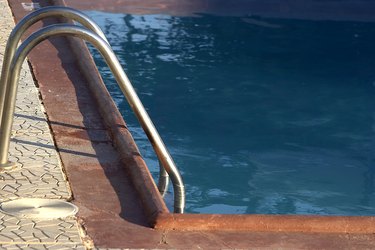
Phosphates are minerals and a vital source of nutrition for plants, including algae. According to Health Canada, algae are not hazardous by themselves, but they reduce the effectiveness of pool sanitizers such as chlorine. Moreover, algae make pool surfaces slippery and lead to an unsightly water appearance. By keeping phosphate levels in swimming pools low, algae growth will be inhibited. Decaying organic compounds, fertilizer, water runoff, rain, dust, suntan oils, soap, and even tap water all contain phosphates and contribute to the growth of algae.
Preventing Phosphates from Entering the Swimming Pool
Video of the Day
Organic matter such as debris from leaves, dead insects, sweat, or skin cells breaks down into phosphates as it decays. Ideally, people should shower before entering the pool to remove sweat, dead skin cells, and residue soaps. Prompt removal of debris by skimming, brushing, and cleaning out the skimmer baskets on a regular basis is imperative to avoid a high concentration of phosphates. According to the International Plant Nutrition Institute, phosphates are frequently added to fertilizers because plants require large quantities of this mineral for healthy growth. Pool contamination due to water runoff from lawns should be avoided. Leaf blowers introduce fertilizers and pollutants in to the pool and must be used with caution.
Video of the Day
Proper Maintenance of Pool
Proper maintenance of the swimming pool includes regular cleaning of the pool and pool filters, an appropriate running time of the pool pump, and an assurance of good water circulation to avoid dead zones. Proper sanitizer levels should be maintained at all times. Chlorine destroys organic waste on contact and as long as an adequate chlorine level is maintained, phosphate levels will be controlled and all but the most stubborn types of algae will be eliminated. Pool stores carry a line of mineral and enzyme-based phosphate removers, which prevent phosphate buildup without adding aggressive chemicals to the pool. These products can be used preventatively on a regular basis.
Summary
A regimen that includes prompt debris removal, maintaining proper sanitizer levels, regular addition of natural phosphate removers, showering before entering the pool, and regular skimming and brushing will help keep phosphate levels low and help prevent algae. According to Poolcenter.com, these measures will also allow for a slower consumption of chlorine, lowering the potential for skin and eye irritation. Regular pool water maintenance is always the best home remedy for reducing phosphates in pools.